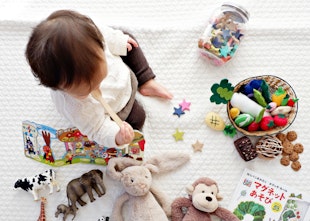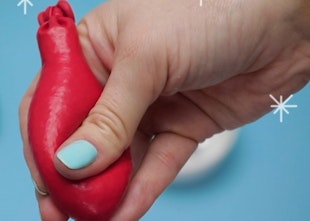During the first year of life, babies use their bodies and their five senses to learn and play.
Sensory play is a valuable way of helping babies to engage in activities that help heighten their senses while encouraging them to explore themselves and investigate the world around them. They do this by tasting, touching, moving, seeing and smelling.
This article is part of our #FamilyFun30 Challenge, where every day we set a simple, accessible and fun task to enjoy with your family. Check out the full list of challenges here and get involved!
Sensory play has been proven to help support language development, social interaction, fine and gross motor skills, cognitive growth and problem-solving skills while also developing and enhancing memory function. Research also shows that sensory play helps build nerve connections in the brain's pathways, therefore, it is crucial for brain development.
Many believe sensory play is picking things up and feeling the texture but there is so much more to it. It is vital as parents to provide plenty of opportunities for babies to actively use their senses and during the first year of life and there are many ways to help your baby develop, learn and grow.

There are many ways to help your baby to start using their senses by playing, investigating and exploring from a young age using age-appropriate play.
By simply using objects that you already have in the house you can create many fun interactive experiences for both you and your child.
From Birth
From birth months, practice skin to skin contact regularly, touch and tickle them to make them laugh and encourage tummy time throughout the day for a few minutes at a time.
It is important that we play with a baby in a variety of positions and environments, so move around the home from one room to another and sing songs to your baby to help enhance their listening skills.
From four months
From about four months, babies become more aware of their surroundings. Playing with a mirror is a fascinating sensory play activity for babies and playing games such as peek-a-boo will teach your baby about object permanence - an important cognitive milestone.
Object permanence allows babies to understand that objects or people still exist even when you can't see them. Your little one should be able to hold and grasp objects from four to six months so now is a good time to promote and encourage hand-eye coordination. Hold out colourful toys that can easily be gripped and see if they will reach out and grab them.
From six months
When a baby is about six months old, they will be more active and engaged in play, making it a more enjoyable experience for you both. From here, you can support their development and satisfy their curiosity through more active sensory play.
Give baby a variety of textures, shapes and colours to explore, reach out and crawl to. Introduce water play as a tabletop activity away from bath time, expose and let them play with different foods and flavours and now is a good time to let them play independently.
Create a safe space for your baby and let them play alone for ten minutes each day - not only will it give you time to sit with a cup of tea, it will teach baby skills to entertain themselves.






